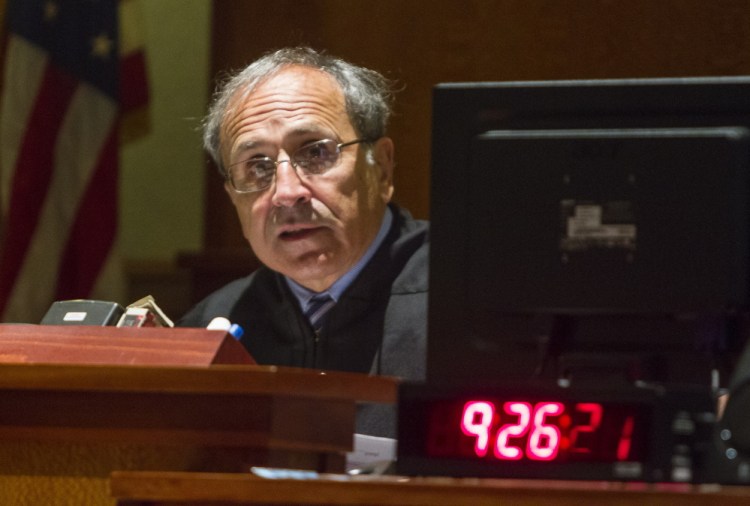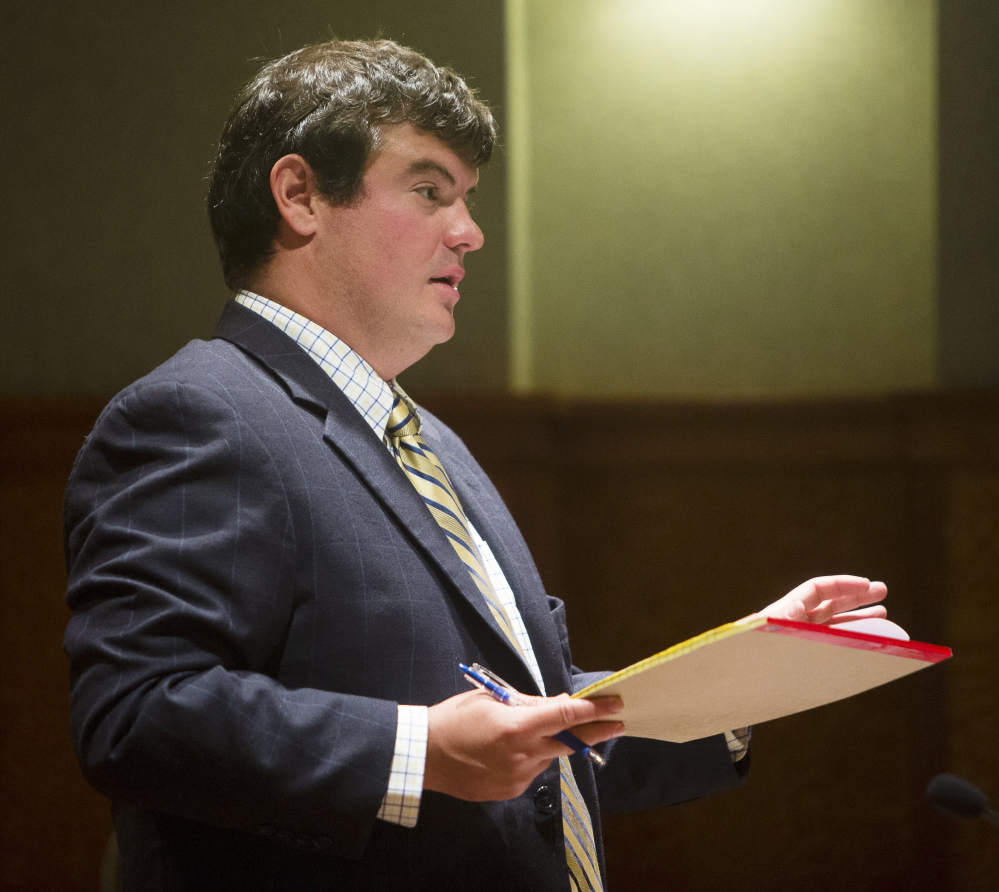As Judge John V. Romei took the bench inside a Portland courtroom last Monday, many of the cases awaiting him involved the typical municipal ordinance violators who land in hot water in Maine’s largest city, from traffic scofflaws to public urinators.
But the latest city “docket day” in Portland District Court was different from most. This time, an attorney from the city’s legal team was in the courtroom to handle a growing number of cases brought against landlords who have not been eager to fix fire code violations.
“The courtroom is the big hammer we have,” Associate Corporation Counsel Adam Lee said after the 45-minute courtroom session. “Having (landlords) stuck in the court process keeps them reactive.” And, he said, “It keeps us accountable, too.”
Less than a year after the deaths of six people in a Portland apartment building fire, Portland fire inspectors and city attorneys are cracking down on landlords who have failed to correct safety violations, by issuing court summonses and threatening to impose fines.
Since May, 151 residential and commercial property owners have received a notice of the city’s intent to prosecute. Forty-three have been served a court summons, according to data provided by the city. Another 30 could be summonsed to appear in court in November, if they don’t contact the city about the violations.
Landlords are receiving summonses for violations ranging from a failure to display street and apartment numbers to more serious violations such as exposed wires, blocked exits and inadequate fire detection systems.
On Monday, the judge issued default judgments against two apartment building owners – the first court approval to issue fines under the new enforcement program. However, city officials say those landlords had responded to the summonses after the court appearances were scheduled and therefore will avoid fines, which would have totaled $500 in one case and $1,000 in another.
The judge also issued a default judgment against the owner of a gas station at 754 Congress St. for not maintaining and inspecting its exhaust or fire systems. The city plans to issue a $1,350 fine against S&A 786 Holdings in that case, Lee said.
The city’s new inspection regime has replaced a much more lenient enforcement process, which involved warning letters that often were ignored. And it has caught landlords off-guard, because the city has not publicized the changes.
Brit Vitalius, president of the Southern Maine Landlord Association, said several members approached him at a recent meeting to ask if the city can legally send summonses through the mail – which it can.
“The initial impression is a little shocked, almost offended, and that it seems pretty aggressive for minor violations for landlords who are pretty good landlords,” Vitalius said. “Clearly they were shaken up and they were upset at how aggressive it was. It’s a change in the process and no one told them. (The city) should have publicized it more.”
City Hall Communications Director Jessica Grondin said it has always been the landlord’s responsibility to provide tenants with safe housing that complies with the city’s building and fire codes. Landlords shouldn’t be shocked that the city is holding them accountable, she said.
“The very fact that people are shocked by this is why they are responding to us, and ultimately complying, and that’s exactly why this enforcement strategy is working,” she said. “We’re very pleased with the cooperation and results we’ve received thus far, and we hope that others agree that it’s in everyone’s best interests.”
NOYES STREET FIRE HAS BROAD EFFECT
More aggressive enforcement is one of many changes afoot after the tragic fire on Noyes Street last November killed six young adults, causing widespread grief in the community and soul-searching in City Hall about ways to improve the safety of the city’s rental housing stock, which is among the oldest in the nation.
State fire officials said the cause of the Noyes Street fire was accidental but that the fatalities were likely caused by life-safety violations. They say the property was being used as a boarding house and lacked an appropriate alarm system. Smoke detectors were inoperable and an emergency exit was impassable, they said.
The property had been the subject of 16 complaints from neighbors since 2003 for issues including trash, an illegal unit on the third floor, and combustible material on the porch.
As a result of the fire investigation, landlord Gregory Nisbet has been charged with manslaughter. He has pleaded not guilty.
Along with the stepped-up enforcement, the city has created a new housing safety office and hired a director to oversee three new inspectors. The office will be paid for with a $35-per-unit fee that landlords will begin paying in January, although city councilors may reduce fees to as low as $15 a unit for landlords who take additional safety measures, such as having a full-building sprinkler system, centrally monitored alarm system or a no-smoking policy.
Portland firefighters have received additional training to improve the quality and consistency of inspections, and the city is creating a public database where residents will eventually be able to research the safety record of any apartment building.
The city also has quietly reinstated proactive housing inspections of apartment buildings with three or more units by the fire department, a program that was previously suspended because it was ineffective. Those inspections resumed in May, city officials said, and roughly 200 routine housing inspections have been conducted.
The Noyes Street fire raised awareness about the safety of rental housing in other communities, as well.
Westbrook has become more aggressive in condemning buildings with severe violations and is considering an ordinance that would force landlords to pay for temporary housing for tenants who are displaced. In Bangor, the city has launched a proactive rental housing inspection program since the Portland fire.
PENDULUM SWINGS IN PORTLAND
Until this year, Portland fire officials would inform landlords of violations and the property owners would have 30 days to respond. If the landlord did not respond, the city would send a second notice, which would begin the legal process.
Landlords would be given another month to respond, but in reality that timeline was often stretched out for months and years. Even then, follow-up would be hit-or-miss.
The Maine Sunday Telegram published two investigations into the city’s inspection program that described how the program’s poor record-keeping, inadequate staffing and lack of communication among city departments – fire, code and legal – prevented meaningful follow-up. The stories also showed how a lack of public information allowed tenants to unknowingly live in substandard housing that the city had deemed off-limits to people receiving public assistance.
Although the city has posted some buildings against occupancy in the past, it never took landlords to court or issued fines.
The fire department issued its first summons in May to Harry Krigman after a 53-year-old tenant at a building he owns at 563 Cumberland Ave. fell to his death from a second-story balcony when the railing gave way. The balconies have been torn down and all remaining violations have been corrected, city officials said.
Assistant Fire Chief Keith Gautreau said the department is issuing summonses for minor violations, such as housing units that don’t have their street and unit numbers displayed, as well as major violations, such as improper fire detector systems. “We have to be consistent,” Gautreau said.
Not even government-owned buildings are getting a pass.
On Aug. 31, the administrative offices of Portland Public Schools were inspected and cited for a few minor violations pertaining to exit signs and a sprinkler system that did not have the correct information on it. The district will receive a notice and go through the process like every other property owner until the problems are resolved.
Now that the city is cracking down on minor and major violations alike, however, some believe the pendulum has swung too far in the other direction.
“When it first happened we were like, ‘Wow, they’re really not messing around,'” said Dan Blake, vice president of Bell Port Property Management, which manages more than 400 rental units in Portland, including a 10-unit building on High Street that was cited by the city.
Blake said his company is quick to fix life safety issues, so the new process is not that alarming. But he could see how landlords with only one or two buildings would be concerned. “I do think it is a little hard for some people to swallow,” he said.
SMALLER LANDLORDS GET SURPRISE
While some of the area’s larger property-management firms are adapting to the new enforcement regime, smaller-scale landlords such as Aaron Jones have been caught off-guard.
Jones has owned a three-unit apartment building at 180 Beacon St. for 10 years, and until this year it had been inspected only once by the fire department, he said. After the property was inspected this year, however, Jones was issued a summons for violations that included holes in the ceiling and a lack of fire doors and carbon monoxide detectors.
“It was shocking to get a summons in the mail, but I’m happy to comply,” Jones said.
On Sept. 11, Jones filed a plan of action to correct the violations, but that was too late for his case to be removed from the District Court docket for Sept. 14, when the city obtained a default judgment against him. Lee, the associate corporation counsel, was prepared to levy a $500 fine – $50 per violation – but will now dismiss the case because all of the violations are being corrected. The city will conduct a reinspection Oct. 30, he said.
When asked why he waited so long to comply, Jones said: “I’m just very busy. I have a lot going on. It was just an oversight. The work is almost done.”
City officials acknowledge that there are kinks to be worked out in the new enforcement system, and say they’re willing to work with landlords to ensure the repairs are made in a reasonable period of time. In District Court, Lee repeatedly asked the judge to postpone cases to the next monthly docket because landlords had contacted the city after being summonsed.
The purpose of the new enforcement regime is to prevent another fatal fire like Noyes Street by having the problems addressed quickly and comprehensively, Lee said. “The little ones become big ones later on,” he said.
Blake, the vice president of Bell Port Property Management, said the city is right to hold landlords accountable.
“When it’s all said and done, it’s what needed to happen,” he said. “Before, people were not taking inspections seriously and there were no repercussions for not doing the work.”
Staff Writer Tux Turkel contributed to this report.
Send questions/comments to the editors.





Comments are no longer available on this story